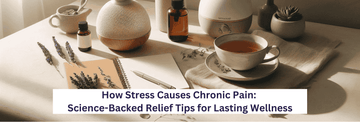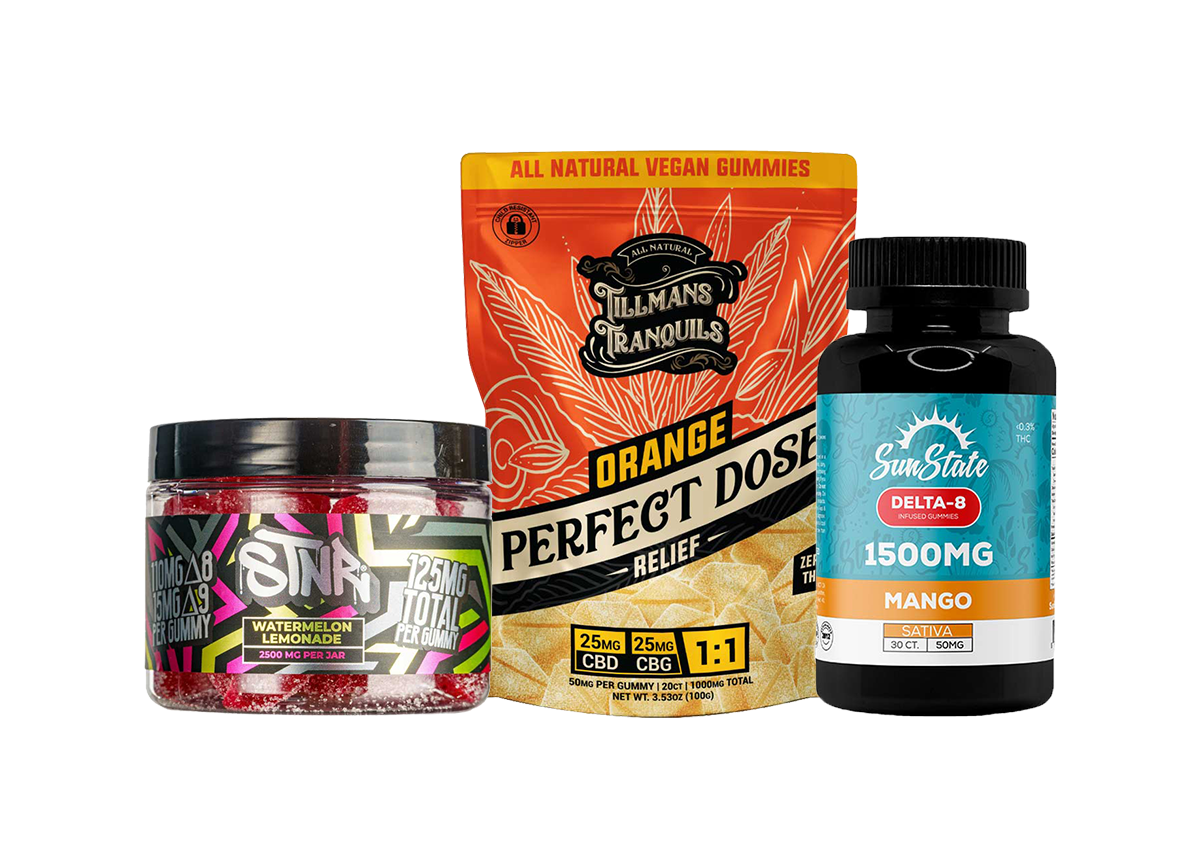Key Takeaways
-
Stress and chronic pain are deeply interconnected, often creating a vicious cycle of inflammation, muscle tension, and anxiety.
-
Chronic stress raises cortisol levels, disrupts the immune system, and amplifies pain signals in the brain.
-
Proven techniques like meditation, gentle movement, CBD, and aromatherapy can reduce both stress and physical discomfort.
-
Building daily stress relief habits is key to long-term improvement in pain management.
Stress has become an unwelcome but constant companion in today's fast-paced world. What many people don’t realize is just how deep the connection between stress and chronic pain goes. If you’re someone who deals with back pain, migraines, fibromyalgia, or general discomfort, stress may be making things worse than you think.
This blog post explores the powerful connection between chronic pain and anxiety, unpacks how stress causes pain, and offers practical solutions and products to ease both. Whether you’re a wellness enthusiast or tired of feeling like your body is working against you, this guide can help you find relief today.

How Stress Triggers Inflammation and Muscle Tension
When we experience stress, our bodies activate the "fight or flight" response. This evolutionary mechanism was designed to keep us safe in life-or-death situations. But in the modern world, it gets triggered by things like deadlines, bills, or even social media comparisons. And here's the kicker: your body doesn’t know the difference.
Cortisol & Inflammation
One of the main hormones released during stress is cortisol, which helps regulate inflammation. In small bursts, cortisol can be helpful. However, chronic stress leads to consistently high cortisol levels, which disrupt your immune system and cause inflammation throughout the body.
Muscle Tension & Pain
Stress often causes people to tense their muscles unconsciously. This can lead to tension headaches, neck pain, or back tightness. Over time, this persistent tension can trigger or worsen chronic pain conditions like:
-
Fibromyalgia
-
TMJ disorders
-
Lower back pain
-
Migraines
If you’re wondering how stress causes pain, this chain reaction—from hormone release to muscle tension to inflammation—is a big part of the answer.
The Chronic Pain and Anxiety Connection
Chronic pain and anxiety have a bi-directional relationship. That means not only can stress contribute to pain, but pain can also increase your anxiety.
This creates a vicious cycle:
-
You feel pain.
-
You stress about it.
-
Your body tightens.
-
Your pain increases.
-
You feel more anxious.
Over time, this cycle can become deeply ingrained in your nervous system. According to the American Psychological Association, chronic stress rewires the brain, reducing your ability to cope with discomfort and amplifying pain signals.
Understanding this connection is crucial for finding real, lasting relief. When you address stress relief for chronic pain sufferers, you're not just easing your mind—you’re treating your body, too.
The Science Behind Stress & Pain
It helps to look at the body’s neurological systems to understand how deeply stress impacts pain.
The Role of the Central Nervous System
Your spinal cord and brain process pain signals. When you’re stressed, your nervous system stays in a state of hypervigilance. That means it’s more likely to amplify minor discomfort into chronic pain.
The HPA Axis & Vagus Nerve
The hypothalamic-pituitary-adrenal (HPA) axis governs your body’s response to stress. Constant activation wears it down, leading to hormonal imbalances and fatigue. Meanwhile, the vagus nerve helps regulate your parasympathetic system (rest and digest mode). If it’s underactive, your body may stay in stress mode longer than necessary.
Pain Memory & Trauma
Chronic stress and trauma can create "pain memories" in the brain. Even if the original injury has healed, your brain might still interpret specific signals as painful.

Real Stories from Chronic Pain Sufferers
Understanding this link is one thing—but hearing real stories makes it personal.
Tina, 42 – Migraines and Mindfulness
"I started meditating for my anxiety, but something unexpected happened—my migraines became less frequent. I never realized how tightly I was clenching my jaw until I actually sat still."
James, 35 – From Tension to Relief
"As a desk worker, my back pain was nonstop. Once I started using a standing desk and walking after lunch, not only did my pain ease, but my mood lifted too."
Maria, 50 – CBD & Journaling
"Journaling helped me recognize just how often I was bottling up stress. Combined with a nightly CBD routine, my fibromyalgia flare-ups went from weekly to monthly."
Want to share your own story? DM us @MyPainCenter – we’d love to hear it.

What the Research Says
Here are just a few findings that reinforce the stress-pain connection:
-
A 2020 Harvard study found that mindfulness meditation reduced pain sensitivity by 32% in chronic pain patients.
-
According to the National Institutes of Health, stress-related hormones can intensify the perception of pain and inflammation.
-
A study published in Frontiers in Psychology showed that daily journaling decreased cortisol levels and improved emotional resilience among people with chronic illnesses.
These aren’t just wellness trends—they’re backed by science.
Best Stress Relief Techniques That Help
Let’s move from theory to action. Here are proven stress relief techniques that help reduce chronic pain by calming the nervous system and improving body awareness.
1. Meditation & Breathwork
Mindfulness meditation helps activate the parasympathetic nervous system, which brings your body into a "rest and digest" state. Regular practice can reduce cortisol levels and pain perception.
Try apps like Insight Timer or Calm to get started. Even 5 minutes a day can help.
Quick Tip: Start your day with 4-7-8 breathing. Inhale for 4 seconds, hold for 7 seconds and exhale for 8. This technique reduces anxiety almost instantly.
2. Gentle Movement
Low-impact exercises like yoga, tai chi, or walking have been shown to reduce both stress and pain. These movements help release endorphins (your body’s natural painkillers) and gently loosen tense muscles.
YouTube channels like Yoga With Adriene are perfect for beginners.
3. Adaptogenic Herbs
Adaptogens like ashwagandha, rhodiola, and holy basil support the adrenal system and help the body adapt to stress.
Look for high-quality supplements or herbal teas with these ingredients.
4. Journaling
Writing out your thoughts can help release mental tension and track pain triggers. Try a structured wellness journal or a simple daily gratitude list.
Consider using this guided pain relief journal explicitly designed for chronic pain sufferers.

Products That Help With Stress & Chronic Pain
Sometimes, you need more than techniques—you need tools. Here are some of the best products for stress relief for chronic pain sufferers that I’ve personally tested or researched.
1. Acupressure Mats
These mats use tiny spikes to stimulate pressure points on your back, helping release endorphins and increase blood flow. Great for tension headaches, neck pain, and tight shoulders.
Check out this top-rated acupressure mat that thousands swear by and has a permanent place in my bedroom.
2. CBD Oil & Topicals
CBD interacts with the endocannabinoid system to reduce inflammation and support mood regulation.
Look for full-spectrum CBD oil for a more comprehensive effect. If you're unsure where to start, visit My Pain Center for third-party tested, effective CBD solutions.
3. Aromatherapy Diffusers
Scents like lavender, eucalyptus, and bergamot can help ease tension and promote relaxation.
Try this beautiful essential oil diffuser for home or office use. Pair it with this stress-relief blend.
4. Weighted Blankets
Weighted blankets offer deep pressure stimulation, which calms the nervous system and improves sleep—a critical factor in pain management.
This weighted blanket is a customer favorite for year-round use.
5. Stress Balls & Fidget Tools
Perfect for managing anxiety on the go. These simple tools give your hands something to do and help release nervous energy.
Keep one of these gel stress balls (affiliate) on your desk or in your bag.

Daily Habits for Reducing Stress & Pain
If you’re serious about long-term relief, it’s all about consistency. Here’s a simple daily routine to help you feel better from the inside out:
-
Morning: Do 5 minutes of breathwork and write 3 things you’re grateful for.
-
Midday: Go for a 10-minute walk and sip on an adaptogenic tea.
-
Evening: Stretch for 10 minutes on an acupressure mat or using a foam roller while diffusing essential oils.
-
Night: Take CBD gummies, use a weighted blanket, and write in your journal.
These small, doable habits regulate your nervous system, reduce pain signals, and help you feel more in control.
Final Thoughts
Chronic pain isn’t just a physical issue—it’s deeply tied to emotional and mental stress. The good news is that when you target stress relief, you often unlock unexpected improvements in your pain levels, too.
By understanding how stress causes pain and embracing holistic tools like meditation, movement, and supportive products, you can start to rewrite your relationship with your body. Whether you're here out of curiosity or desperation, take this as your reminder: healing is possible.
Want more wellness and pain relief tips? Subscribe to our newsletter and follow us on Instagram for daily support.
Affiliate Disclosure: This post may contain affiliate links, meaning we may earn a small commission if you purchase through these links. Thank you for supporting our mission to help people live with less pain and more joy.

